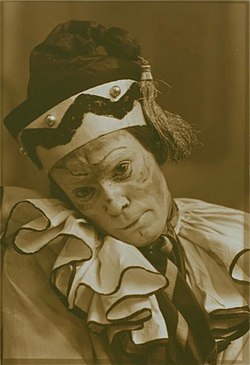Petrouchka
| Petrushka | |
|---|---|

Nijinsky as Petrushka
|
|
| Choreographer | Michel Fokine |
| Music | Igor Stravinsky |
| Libretto | Igor Stravinsky Alexandre Benois |
| Based on | Russian folk material |
| Premiere | 13 June 1911 Théâtre du Châtelet Paris |
| Original ballet company | Ballets Russes |
| Characters | Petrushka The Ballerina The Moor The Charlatan |
| Design | Alexandre Benois |
| Setting | Admiralty Square Saint Petersburg Shrovetide, 1830 |
| Created for | Vaslav Nijinsky |
| Genre | Ballet burlesque |
Petrushka (French: Pétrouchka; Russian: Петрушка) is a ballet burlesque in four scenes. It was composed in 1910–11 and revised in 1947. Igor Stravinsky composed the music, and, with Alexandre Benois, fashioned the libretto. Michel Fokine choreographed the ballet; Benois designed the sets and costumes. Petrushka was first performed by Sergei Diaghilev's Ballets Russes at the Théâtre du Châtelet in Paris on 13 June 1911. Vaslav Nijinsky portrayed Petrushka with Tamara Karsavina as the Ballerina. Alexander Orlov portrayed the Moor, and Enrico Cecchetti the Charlatan.
Petrushka tells the story of the loves and jealousies of three puppets. The three are brought to life by the Charlatan during the 1830 Shrovetide Fair (Maslenitsa) in Saint Petersburg, Russia. Petrushka loves the Ballerina, but she rejects him. She prefers the Moor. Petrushka is angry and hurt, and challenges the Moor. The Moor kills him with his scimitar. Petrushka's ghost rises above the puppet theatre as night falls. He shakes his fist at the Charlatan, then collapses in a second death.
Petrushka brings music, dance, and design together in a unified whole. It is one of the most popular of the Ballets Russes productions. It is usually performed today using the original designs and choreography. Grace Robert wrote in 1946, "Although more than thirty years have elapsed since Petrushka was first performed, its position as one of the greatest ballets remains unassailed. Its perfect fusion of music, choreography, and décor and its theme—the timeless tragedy of the human spirit—unite to make its appeal universal".
...
Wikipedia
